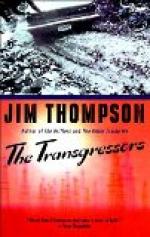What actually transpires is a surprise to him, as it is to all but three of the committee.
When the routine of business has been gone through with, the chairman announces that the meeting will proceed to the consideration of new business, if there is any.
William Nevins, the man who had carried the Stars and Stripes at Hazleton, now a committeeman who has always taken a subordinate part in the work, asks to be heard.
Supposing that he is to speak on the one subject uppermost in the minds of the committee, the chair recognizes him. Rising from his seat in the back of the room Nevins walks to the front of the hall, and standing before the chairman, half turns so as to face the men in the assembly.
From his first words it is apparent that he has a matter of grave concern to impart. The attention of all is engaged.
“Mr. Chairman,” he begins, “I am unaccustomed to speech-making; yet on this occasion I feel that I am capable of expressing myself in a manner that will be clear and forceful. I am to tell you a few truths, and in uttering the truth there is no need of depending on rhetoric or oratory.
“As you all know, I am a poor man. How I came to be reduced to a position little better than beggary is not known by any of you, for I have studiously avoided airing my troubles to any one. To-day I intend to tell the story. It will cast some light on the subject that we will be called upon to discuss later.
“We have no time to hear the life-story of any one,” sententiously observes a man in the front seat.
“But you will have to take time to hear me,” retorts Nevins, and he continues.
“I was a graduate of Yale, in the class of 1884. My name was not Nevins, then. After a year spent in travel in Europe I returned to the United States and began to practice my profession of a civil engineer, in the city of New York. My father had died when I was a child and had left my mother a fortune of about $40,000. From this sum she derived an income of $2000 a year. She gave me an allowance of $800 up to the time that I began to work as an engineer.
“Two years after I had entered the office of a leading railroad I planned an extensive change in the working of the road and submitted it to the president. He approved of the suggested changes and put the matter before the board of directors. Shortly afterward I was informed that I could proceed with the work. The work was accomplished and the officials were more than pleased. They made me chief engineer of the road and a stockholder. I soon had a considerable block of stock. Then a great Magnate looked at the road with covetous eyes, and ruin came upon us.
“The stock of the road was depreciated and borne down on the Exchange until the road became insolvent. All my money was in the road, and when the crisis came I found myself stranded. The King of the Rail Road Trust, Jacob L. Vosbeck, bought up the stock and then raised it to even a higher figure than it had ever before attained.




